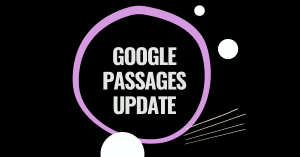Google is back at it with another algorithm update — and just in time to scare us for the chilling holiday ahead. Much to search and content marketers’ dismay (or at least to my own), their only constant seems to be change. But, at least Google keeps us on our toes, right? *Laughs nervously.*
As capricious as Google may be, each update promises improved search results for users across the globe. According to the search giant, they’re “bringing the most advanced AI into [their] products to further [their] mission to organize the world’s information and make it universally accessible and useful.”
Last week, they announced an update on passage ranking (initially known to SEOs as passage indexing, but more on that later). This update focuses on excerpts from a page rather than considering one topic for an entire page.
Right now, Google checks if an entire page is relevant to a search query before displaying it on the SERP. After implementing their new passage understanding capabilities, Google will determine if a specific passage of a page is more relevant to a particular query than a broader page on that topic. Once the update rolls out at the end of this year, Google estimates it will affect 7% of search queries globally.
How This May Affect Our SEO and Content Strategies
As the update is implemented, you may notice certain pages on your website are ranking for different keywords, particularly if any of your pages offer multiple topics. Think: an FAQ page, a page listing multiple services, etc.
I predict it will put a greater emphasis on how we create headlines and body copy (cue content marketers). SEO and content strategies will need to be more aligned for on-page optimization. After all, teamwork makes the dream work.
Also, keep in mind this is a ranking change, not an indexing change (as it was initially referred to). When the article was published on Oct. 15, Google stated they are “now able to not just index web pages, but individual passages from the pages.” Since then, they’ve debunked several misinterpretations about the indexation of passages.
Long story short, Google will still index pages as a whole but will have the added ability to get down in the nitty-gritty of your content. SEO and content marketers, are you ready to rumble?
The Industry Tea
Leading SEOs are having mixed reactions. Rand Fishkin, founder of SEO software company Moz, thinks Google is going too far in their quest to dominate the Internet.
Makes you wonder: is Google deliberately trying to steal your search traffic? With more than 50% of Google searches resulting in zero clicks, it’s hard to imagine they actually want you to leave their platform. Reminds me of the creepy twins from The Shining: “Come play with us, Danny. Forever… and ever… and ever.”

On the other hand, Dr. Marie Haynes, founder of Marie Haynes Consulting and leading SEO, has a less doom-and-gloom view of the update.
So, which is it? Will this update hurt your overall website traffic or will your content get more eyes on it than before?
Oh, You Askin’ Me?
As Rebel’s senior content & SEO strategist, I’m in a fortunate position to form a congruous opinion. I live in a frolicsome land where content and SEO marketers hold hands, sing, and dance to develop creative, timely, data-driven strategies that work.
I think this update will give companies the opportunity to do just that (well, the latter anyway). Content and search marketers will have to work more closely for their website’s greater good (i.e. to improve their website’s rankings). It’ll be more important than ever to include industry-specific keywords throughout your webpage copy.
While it’s crucial to note this may negatively affect your overall website traffic, it could entice users to read more, learn more, etc. and ultimately offer higher click-through rates. Also, if the passage ranking update effectively becomes part of your strategy, you’re looking at more impressions in the SERPs and a better chance to compete.
And when you consider the sales funnel based on search intent, this update doesn’t seem so scary after all. Informational/awareness searches are at the top of the funnel and will be most affected by this update. Transactional/purchase searches are at the bottom, more definitive and may not see much change. This means your conversion rate shouldn’t suffer.
Are you still thinking: “how do I tackle this and/or future updates?” Don’t be frightened — Rebel’s always on the lookout for any (Google) ghosts under your bed and is ready to tackle the big, bad search engine’s ever-changing algorithm.
So, who you gonna call?

